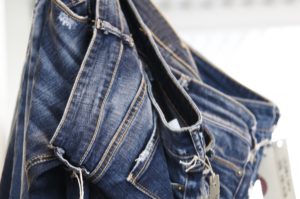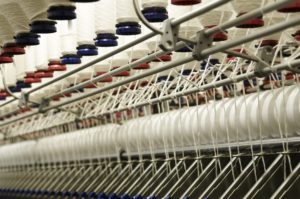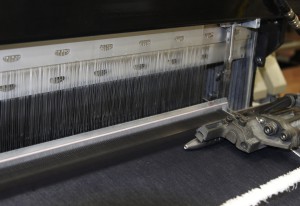 Denim is a cotton fabric, and cotton, we know, has a high environmental impact: occupying huge tracts of land it requires large volumes of water and of fertilizers and insecticide, and it takes a large amount of fuel to carry it from the fields to the production sites. And this is only the beginning: then follow the stages of spinning, weaving, dyeing, finishing that require high energy and water consumption to which we have to add emissions to water and atmosphere.
Denim is a cotton fabric, and cotton, we know, has a high environmental impact: occupying huge tracts of land it requires large volumes of water and of fertilizers and insecticide, and it takes a large amount of fuel to carry it from the fields to the production sites. And this is only the beginning: then follow the stages of spinning, weaving, dyeing, finishing that require high energy and water consumption to which we have to add emissions to water and atmosphere.
Luigi Caccia, the young owner of Italdenim, manages one of the leading companies in Europe for the production of denim. In Italdenim only 25% of the yarn is purchased from suppliers, which results in a low environmental impact of its logistics. It certainly is an ecologically committed company. But how do they look for raw materials?
«When selecting cotton we do not just evaluate its quality standards – explains Luigi Caccia – but we look for raw materials with a history of sustainability: Gots or Fairtrade certified organic cotton or BCI cotton. Furthermore, we recover all production waste and recycle it. The polyester used in some product lines comes from second life PET”.
But it is mainly in the production process that cotton denim fabric becomes more or less ecofriendly.
 «Spinning, weaving and dyeing operations are energy intensive, so we made a cogeneration plant that produces the energy we need, and let us recover heat that would otherwise be lost by reducing the emissions of CO2. When choosing the production machinery we privilege, where possible, the highest energy efficiency, we rationalize the flow of manufacturing and logistics without neglecting the safety and welfare of those who work there. But in order to provide customers with a sustainable denim we have to intervene mainly on the processes of finishing».
«Spinning, weaving and dyeing operations are energy intensive, so we made a cogeneration plant that produces the energy we need, and let us recover heat that would otherwise be lost by reducing the emissions of CO2. When choosing the production machinery we privilege, where possible, the highest energy efficiency, we rationalize the flow of manufacturing and logistics without neglecting the safety and welfare of those who work there. But in order to provide customers with a sustainable denim we have to intervene mainly on the processes of finishing».
Finishing: the heart of the problem
The Detox campaign launched by Greenpeace made brands face their responsibilities in terms of ecological impact, indicating 11 chemicals as the cause of pollution; all of them have already been taken into account by Reach but Greenpeace aims at totally eliminating them from the textile products. How does Italdenim deal with such a request?
«The pressure from environmentalists on the big fashion brands helps to spread a new awareness in the public opinion. Consumers do not want to feel co-responsible for the serious pollution of rivers or for the death of Asian people for silicosis, as in the case of the sandblasted jeans commissioned in Bangladesh. The fashion brands that are more attentive to the issue of sustainability will give their priority more and more to responsible manufacturing partners that operate in transparency and legality. This will result in an important opportunity for manufacturers of fabrics made in Italy who have invested in sustainability. We are ready».
 Perhaps the time is ripe to finally get a nice piece of garment that also combines a low environmental impact. Ecology hand in hand with the style?
Perhaps the time is ripe to finally get a nice piece of garment that also combines a low environmental impact. Ecology hand in hand with the style?
«Fabrics by Italdenim boast certifications such as Oeko-Tex, GOTS; the company joined the Unionfiliere traceability system and is ISO 14001 and SA8000 certified but if we want continuous improvement this is not enough. Achieving sustainable products means doing research and innovation on raw materials, on the chemicals used and on technologies. For example, we found that the usage of diluted indigo allows us to reduce significantly the process water and the quantities of sulfite and that, in order to get black and brown tones, it is preferable to use sulfur dyes that allow reduced water consumption in the dyebaths. We are also the first denim company that produces home-made auxiliaries, starting from actives until we get the recipe that allows the best results. We are testing a product of cellulose origin in lieu of synthetic substances in the dyeing processes. Sustainability is based on continuous research, experimentation».
Emissions to water are critical for the denim business.
«The liquid waste of our desizing, being starches, have a high degree of biodegradability but certainly the discharging of the stages of scouring, washing, mercerizing and finishing requires particular care. For this reason Italdenim supplied a purification area of 5000 m2 in which the waste water is conveyed to be treated by enzymes and bacteria before proceeding to the separation of the sludge which are then extracted and sent to the dehydration process. Finally, these are sent to the landfill».
In two words, which is the philosophy of Italdenim?
«Being sustainable means to do good every day without forgetting the little things and involving people who work with us inside and outside the factory».




